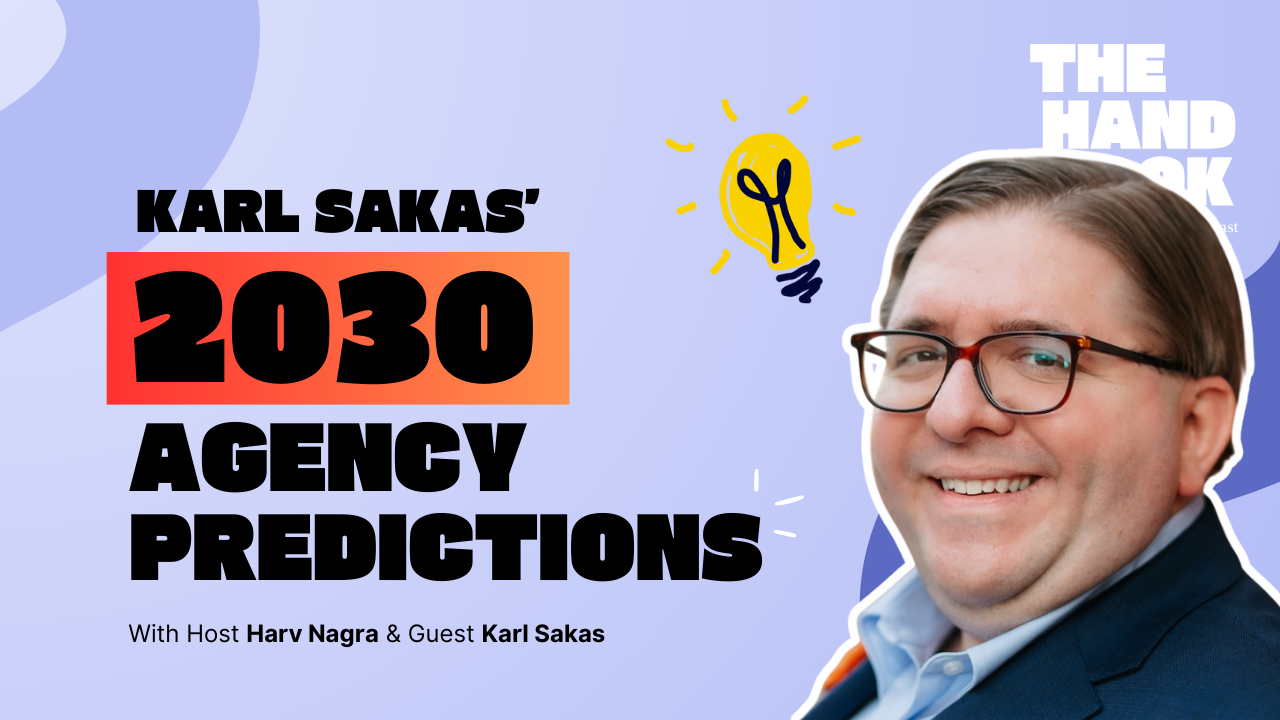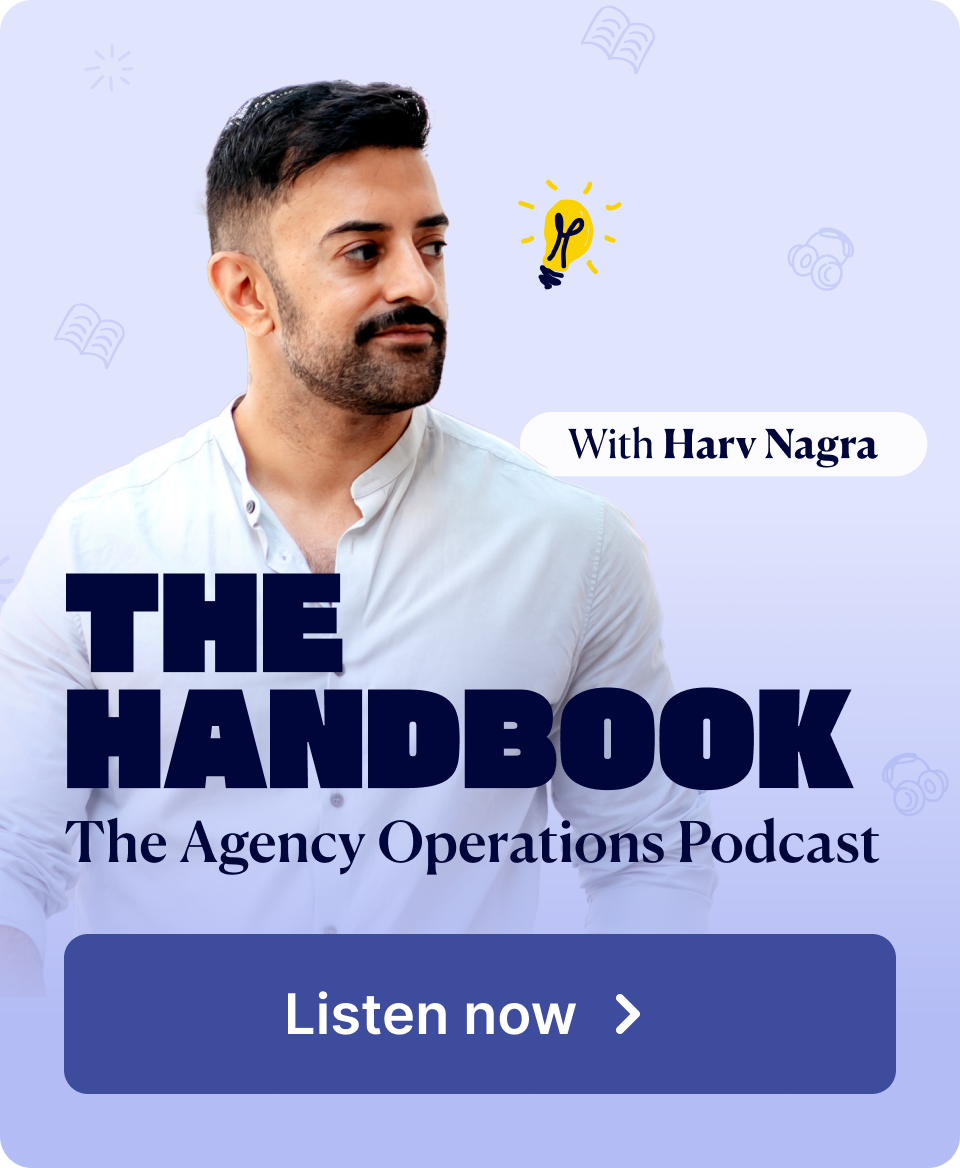
Every leader has their success stories – the things you changed or experimented with that made a big difference.
I spoke about this in the latest episode of The Handbook podcast, where I interviewed Trenton Moss.
Two things that accelerated my agency’s growth:
1) Moving on from the ‘make things up as you go’ era
We had multiple entities – each with its own set of tools, and no codified best practices. In order to grow up, we needed more control and visibility of our projects, and better collaboration.
So we brought in a PSA (Professional Services Automation Tool) and replaced our four separate Harvest accounts (one for each entity!). This finally allowed us to collaborate across entities, report on the group’s performance, and get out of attempting to reconcile things in spreadsheets all day.
This also brought with it – for the first time – documented best practice. Rather than everyone having their own way of doing things, duplicating old quotes, not tracking time – we suddenly had best practices.
We sold these changes in via a change management process that helped people understand the why, and what’s in it for them – not just the how (you can listen to my experience in a previous episode of the podcast).
It was a huge change.
The next leap in maturity was even bigger.
2) A decision to grow up: Consolidating tools, centralizing knowledge, and restructuring
We brought in fit-for-purpose tools, developed an agency handbook as a single source of truth, and restructured for better accountability.
Over about a year and multiple changes, we emerged as a completely new, mature business.
Colleagues that had been at the agency prior to the changes, noticed the difference. And those that joined after were blown away by how well things operated.
Those are the two projects I was most proud of. Trenton Moss, former agency founder and now agency coach, tells us this week in the podcast about his biggest wins (and a couple of missteps too).
These include incentives for growing accounts, getting the team to be more entrepreneurial, and setting up an advisory board with the best minds in the industry.
I loved hearing every story Trenton had to tell, and think you’ll be inspired by them too. More details below.
Until next time,
Harv Nagra
Ops consultant & former agency ops director
🎧 The Handbook: The Agency Operations Podcast:
Trenton Moss is a former agency owner who ran his business for 15 years before it was sold. Trenton shares the key decisions that transformed his agency, along with some missteps along the way.
Trenton explains three major changes he made and how he did it:
- Setting up team pods with a highly effective reward system.
- Developing ongoing client services training and putting the learnings into practice.
- Creating an advisory board to guide the agency.
Now a leadership coach, Trenton has been coaching and training teams for nearly 20 years. You can check out his website, Sterka, his book Human Powered, you can also subscribe to Human Powered: The Podcast via his website.
🎧 Listen now on Apple, Spotify, or YouTube.
Key Takeaways:
- Trenton’s US expansion attempt was a misfire. If he were to do this again, Trenton would ensure he had a large client providing at least six months of work. He’d use the profits from this to acquire additional clients. (9:48)
- Implementing a profit-sharing scheme was a disaster. It quickly became an expectation. When payouts didn’t occur, employees became annoyed. (11:24)
- Instead of profit sharing, Trenton introduced the “We Made It Fund” (WMIF). The team earned a cash pool to put towards activities of their choice, with earnings depending on the size of the deal. This encouraged team bonding and celebrations. It also motivated the team to secure bigger deals. (14:10)
- Organizing the agency into pods with targets, gave delivery people a more commercial mindset. Everyone started thinking about new opportunities for client accounts. Combined with the WMIF, this structure motivated everyone to contribute to the business’s commercial success. (16:41)
- Weekly in-person team training sessions were held to develop client skills. To ensure new learnings stuck, they repeated the material, built upon it, and kept the conversation ongoing, integrating it into all processes. This helped drive a 35% uplift in revenue. (20:23)
- Understanding what success means for the business was important. The leadership team decided what “good” looks like – and then let employees implement their own strategies. This gave everyone the freedom to determine their own growth plan. (25:07)
- Trenton discusses what motivates people – autonomy, mastery, and purpose. Autonomy = having ownership. Mastery = the ability to get good at something. Purpose = understanding why you’re doing something. (30:02)
- Setting up an advisory board helped Trenton’s agency overcome bigger challenges. It forced management to step out of day-to-day tasks and start planning and acting strategically. (36:52)
- When times were tough, Trenton doubled down on his agency’s niche. They created content, communities, and events tailored to that niche. This was hugely successful. It provided value to others (including clients and prospects), but also attracted business. (44:27)
Learn more:
📕 Case Study
Learn how this professional services company improved internal collaboration and client communication using Scoro.
🔎 Help Center
Scoro’s real-time reports are ideal for leadership and board meetings. See revenue recognition and forecasting reports in Scoro.
💡 Blog Article
Learn how to set project KPIs to define what a successful project looks like in your business.




